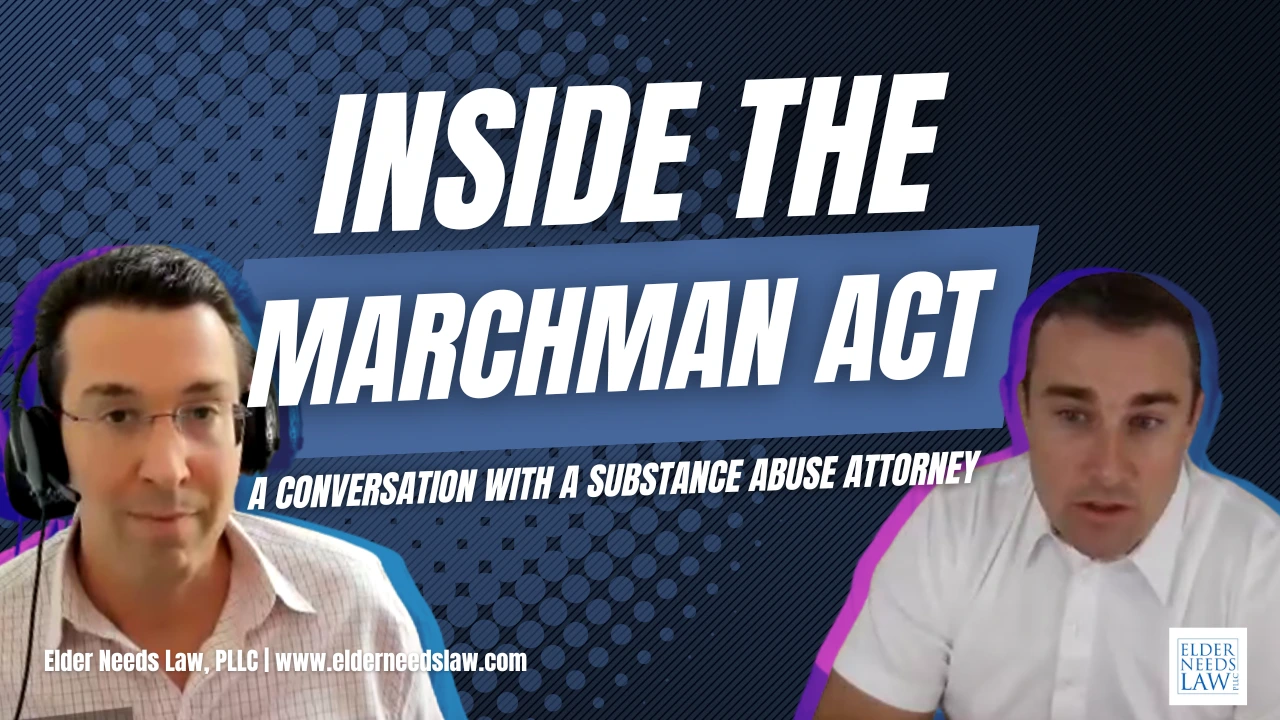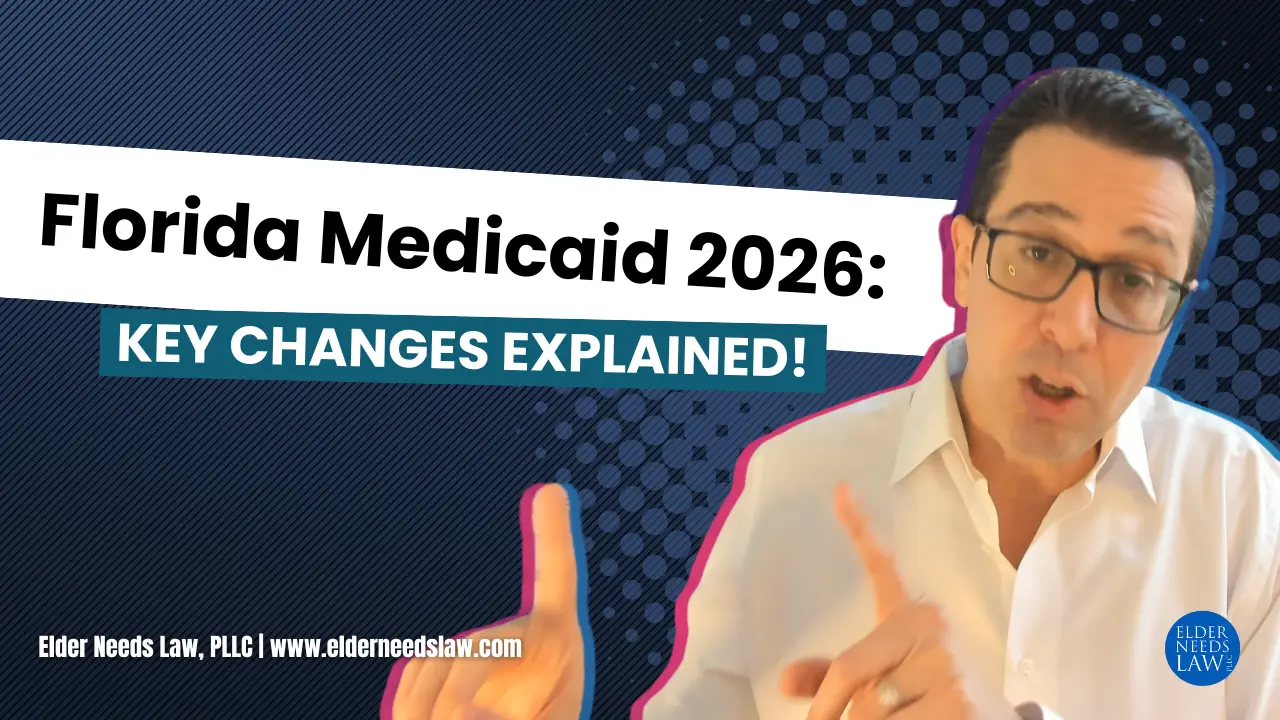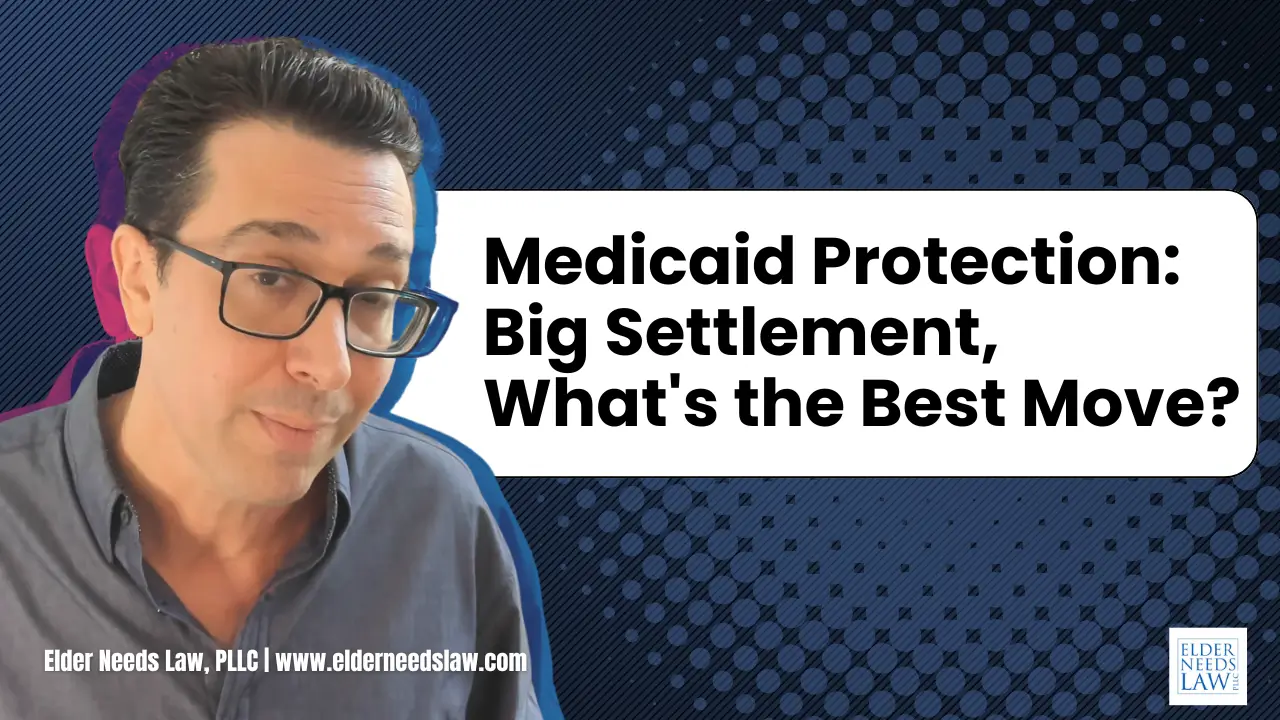The Florida Marchman Act: A Family's Guide to Getting Help for Loved Ones with Substance Abuse

When someone you love struggles with addiction, watching them deteriorate while refusing help becomes one of life's most heartbreaking challenges. Many families feel powerless, especially when their loved one has already tried treatment before and continues to refuse further help. In Florida, the Marchman Act provides a legal pathway for families to intervene when substance abuse threatens their loved one's life and safety.
As an elder law firm, we don't handle every issue that might impact the life of an elderly or disabled individual (or their families), which is why we bring this interview series to our loyal readers and viewers. The information in the video and article below are gleaned from my interview with Richard Casey with the law firm: Robinson & Casey.
What Makes the Marchman Act Different
The Marchman Act stands as Florida's unique legal tool for addressing substance abuse situations. Unlike the more commonly known Baker Act, which focuses on mental health emergencies and typically involves 72-hour holds in psychiatric facilities, the Marchman Act targets substance abuse disorders and allows for up to 90 days of treatment.
This law applies to anyone located in Florida, even visitors, and covers various forms of substance abuse including alcoholism, illegal drug use, and prescription medication misuse. The key factor isn't whether the substance is legal or illegal, but whether someone is misusing, abusing, or dependent on alcohol, illicit substances, or prescription medications.
While primarily focused on substance abuse, the Marchman Act can also address co-occurring issues like mental health disorders, gambling addiction, or eating disorders when substance abuse plays a role.
When Should Families Consider the Marchman Act?
The decision to pursue legal intervention never comes easily. Most families considering the Marchman Act have already attempted multiple approaches. Their loved one typically has:
- Previously attended treatment but continued using substances
- Refused to return to treatment despite repeated interventions
- Experienced serious life consequences like job loss, health problems, or legal troubles
- Been hospitalized due to substance abuse
- Received medical diagnoses related to their addiction (such as cirrhosis)
- Suffered overdoses or psychiatric episodes (including cannabis-induced psychosis)
- Demonstrated vehement opposition to getting help
The common thread involves someone refusing to give up substance use despite clear negative consequences and previous treatment opportunities.
The Marchman Act Process: What Families Can Expect
Initial Crisis and Contact
Most families contact attorneys when their crisis reaches a breaking point, though earlier intervention often provides more options and better outcomes. The process begins with an immediate intake call where attorneys gather basic information about the situation, the person needing help, location, and specific needs.
Same-day or next-day consultations follow, providing detailed discussions about the Marchman Act process and gathering comprehensive facts about the case.
Rapid Legal Action
Once families retain legal representation, Marchman Act attorneys commit to filing court documents within 12-24 hours. This quick response addresses the emergency nature of most situations and prevents further deterioration.
NOTE: our firm does not handle Marchman Act cases. Click on the video above for our interview with Robinson & Casey, PLLC, a firm that specializes in Marchman Act cases.
Court Review and Orders
The court reviews the petition for two distinct purposes:
Long-term Treatment Hearing: The court schedules a hearing to determine whether the individual should receive treatment for up to 90 days. This represents the significant difference from Baker Act proceedings – families request extended treatment rather than emergency evaluation.
Emergency Assessment Order: Before the hearing, the court determines whether an immediate emergency evaluation is necessary. If approved, law enforcement receives authorization to transport the individual to a detoxification and assessment facility.
Law Enforcement Involvement
When emergency transport becomes necessary, specially trained crisis intervention officers handle the situation. These officers approach the situation with the goal of safe transport rather than forcible removal. They explain the court order and work with individuals to gather personal items when possible before bringing them to treatment facilities.
Legal Representation for All Parties
The individual subject to the Marchman Act receives the right to legal representation. They can hire their own attorney or have one appointed if they cannot afford representation. This ensures fair legal process and proper advocacy for everyone involved.
Having professional legal representation benefits families immensely during this stressful time. Attorneys who practice Marchman Act law know how to prepare cases properly, work with opposing counsel effectively, and access quality treatment facilities rather than just state-funded programs.
The Hearing Process
The initial hearing occurs within ten days of filing the petition. By this time, the individual typically remains in continuous care from the moment of law enforcement contact or facility admission through the hearing date. The facility provides a professional assessment to present at the hearing.
Different counties handle procedures differently, making local knowledge invaluable for successful outcomes.
Addressing Family Concerns
Relationship Impact
Many families worry about damaging their relationship with their loved one. The person struggling with addiction often makes hurtful accusations and uses manipulative tactics to avoid treatment. However, these behaviors typically come from the addiction, not the person families remember and love.
The Marchman Act helps by placing the court in the position of requiring treatment, removing blame from family members. Rather than parents, siblings, or spouses being the "bad guys," the legal system takes responsibility for mandating care.
Long-term Outcomes
Families who have successfully used the Marchman Act often report positive long-term results. Once individuals achieve sobriety and mental clarity, they frequently express gratitude for their family's intervention. Many people who went through Marchman Act proceedings later describe it as "the best thing my family ever did for me."
The person hurling insults and refusing help isn't the same person families remember. Addiction changes people fundamentally. Legal intervention provides a path back to the person families want to reconnect with.
Why Professional Legal Help Matters
While families can technically file Marchman Act petitions without attorneys, professional representation offers significant advantages:
- Proper case preparation that courts and opposing counsel recognize
- Access to quality treatment facilities rather than just state-funded programs
- Protection from accusations of abuse or misuse of the legal system
- County-specific knowledge since procedures vary significantly across Florida
- Emotional buffer between families and their loved ones during proceedings
- Strategic facility placement to access some of the best treatment centers in the country
Moving Forward with Hope
The Marchman Act represents a display of love, not punishment. When someone cannot make healthy decisions due to addiction, family intervention becomes necessary. Whether through the Marchman Act or other intervention methods, most people enter treatment because their families took action.
This legal tool provides hope for families who have exhausted other options. It offers a structured, court-supervised pathway to get loved ones the extended treatment they need while protecting everyone's legal rights.
Additional Resources for Florida Families
If you're dealing with elder care concerns alongside addiction issues, or if you need guidance on protecting assets while addressing family substance abuse problems, comprehensive legal support becomes even more important. Planning for long-term care needs while managing family crises requires careful coordination.
For more information on assistance with Marchman Act issues, contact Robinson & Casey or the Marchman Act attorney of your choice.
For more information about protecting your family's financial future and accessing care resources:
Visit our website: elderneedslaw.com Medicaid Planning Resources: medicaidplanninglawyer.com Essential Reading: "Medicaid: How to Pay for Some of Your Long-Term Care Expenses" - Available on Amazon
Taking the Next Step
If your family faces a substance abuse crisis and traditional interventions haven't worked, don't wait until the situation becomes more dangerous. The Marchman Act provides a legal framework for getting your loved one the help they need, even when they refuse voluntary treatment.
Remember that seeking help through legal channels doesn't mean giving up on your family member – it means refusing to give up on their potential for recovery. With proper legal guidance and access to quality treatment facilities, the Marchman Act can provide the intervention that saves lives and restores families.
Every situation is unique, and timing matters. Getting professional advice early in the process provides more options and better outcomes than waiting until crisis points arrive. Your loved one's life may depend on taking action before it's too late.







